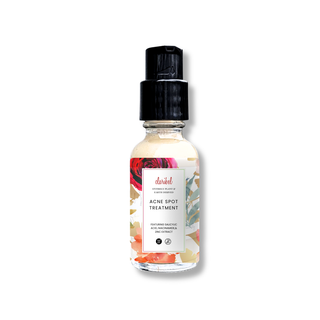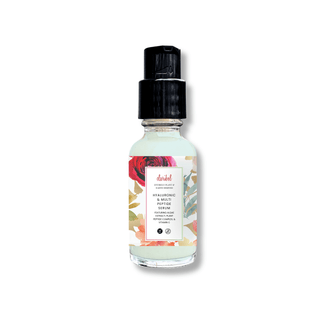Retinol for Skin Care: So Many Amazing Benefits
Retinol for Skin Care
Retinol offers a multitude of benefits, and we wanted an opportunity to expand on those here. Retinol can come in natural forms, and it can come in prescription strength. It can be derived from many plant sources, and it's those derivatives that we include in our formulations. They're gentle enough for everyone yet effective enough to help you reach your skin care goals.
What is Retinol?
Retinol (Vitamin A) is derived from a variety of plant sources, like sweet potatoes, winter squash, kale, collards, carrots, spinach - as well as some fruits, like melon, grapefruit, watermelon, papaya, tangerine, and passion fruit to name a few.
How Can Retinol Help Your Skin?
There are some significant benefits to using products with retinol or retinoids. Our Organic Retinol Superfood Cream is an excellent choice if you’re looking for effective, organic ingredients to promote better looking skin.
Many people believe they can’t use retinoids, because they feel that retinol or forms of vitamin a re a harsh ingredient.
Even if you have sensitive skin, you can use it and benefit greatly from it, and the truth is anyone can use it. It’s a proven fact that you can build your tolerance it with time.
Over-the-counter retinols can give you the same results of a prescription,” said Marnie Nussbaum, a dermatologist in Manhattan and an assistant professor at Cornell NewYork-Presbyterian Hospital.
According to a study published in February in the British Journal of Dermatology, 0.5 percent naturally derived vitamin a cream applied twice a day was as effective in decreasing wrinkles and hyperpigmentation as 0.5 percent over-the-counter retinol applied once at night.
Per a Harvard study: Retinoids reduce fine lines and wrinkles by increasing the production of collagen. They also stimulate the production of new blood vessels in the skin, which improves skin color. Additional benefits include fading age spots and softening rough patches of skin.
Benefits of Retinol For Your Skin
BENEFIT #1:
Reduction of sun spots and discoloration. Retinol has been proven to gradually eliminate sun spots and help prevent the development of future sun spots and discoloration.
Dark spots are a build-up of extra pigment that can be brought on by excess sun exposure, acne, or even hormonal changes. Before running to your dermatologist, try adding retinol to your daily routine. This will help you remove dark spots and pigments and restore your skin to an even tone.
BENEFIT #2:
Reduction of wrinkles. We know from studies that retinoids reduce wrinkles and help lessen the frequency of them by increasing collagen production.
Retinoids can also stimulate the production of new blood vessels in the skin, which improves skin color.
BENEFIT #3:
Future protection of photo aging. Pretreating the skin with retinoids can prevent ultraviolet (UV)-induced damage in the first place, per an Oregon State University study.
One of the top medical therapies in randomized clinical trial evidence is the use of topical retinols in a variety of forms, which are capable not only of repairing photoaged skin at both the clinical and biochemical levels but their use may prevent photoaging.
BENEFIT #4:
Increased collagen production. Mervyn Patterson, a cosmetic doctor at Woodford Medical, states that you start to lose collagen in your face from your mid 20s, and lose something between 1-1.7% a year from then onwards — a scary thought.
Some people view retinol as an exfoliant, because it can sometimes leave the top layers of our skin with a peeling appearance, or flaking, but it’s not a peel. It’s caused by the skin developing more collagen, hence the older top layers turn over and lift away faster than normal. This process helps increase collagen production substantially.
BENEFIT #5:
Promotes wound healing. This is especially important for people who have suffered or currently suffer from acne, just finished a chemical peel, administered a topical scrub or exfoliation, or acquired a sunburn. (As for benefits to acne sufferers, retinol can help unclog pores and reduce the production of sebum.)
Retinoids are widely used in dermatology and may play a role in wound healing. There is also some evidence that when retinol is applied to skin that is wounded (acne, after a chemical peel, after a topical scrub, after a sunburn, etc.), studies show that there is a favorable effect of wound-healing properties.
Myths About Retinol
MYTH #1:
You should not use retinol during the day. This is untrue based on one common sense reason. When you add a layer of sunscreen over your retinol application, which will obviously protect skin from UV damage, you're granting your skin the protection it needs (on a daily basis with our without retinol). But studies show that retinol in itself does not cause the skin to absorb UV light. Nonetheless, if you're a regular sunscreen user, you can continue to use your favorite retinol products as you wish.
MYTH #2:
You should only apply it to dry skin. There is no medical study or proof that retinol is only effective when applied to dry skin. Studies have shown that it is equally effective when applied to damp skin, and when it is applied as a layer with other products. It can actually be a good idea to apply retinoid products with other products that contain vitamin c and/or alpha hydroxy acids. These combinations can increase effectiveness.
MYTH #3:
If your skin is sensitive, you are stuck using mild percentages of retinol. With time and regular use, you can gradually increase the strength or frequency of your retinol use. Even people with sensitive skin, who express some patience when getting acclimated to retinol, can eventually build up their tolerance and thus reap the rewards that retinol offer.
MYTH #4:
You should not put retinol around your eyes. Just like anywhere else on your face or body, retinol around the eyes can be very beneficial. Sure you may need to slowly and gradually acclimate your skin to it, but you will definitely see the benefits if you stick with it.
MYTH #5:
It can thin your skin. There are a few myths about retinol products that may erroneously shy potential users away, including the idea that retinol products will thin out skin over time. This is simply not true. Retinol studies have proven that it definitely helps to thicken skin. It does this by boosting your natural production of collagen, leading to fewer fine lines and wrinkles and plumper, bouncier skin.
TWO THINGS YOU CAN DO TO PREPARE YOUR SKIN FOR THE USE OF RETINOL
#1: Niacinamide. Combining retinol with niacinamide has been proven to help decrease retinol irritation. Looks for products that contain niacinamide to help prepare your skin.
#2: Add a layer of moisture protection. Adding an extra layer of lotion or cream before applying your retinol product to help reduce sensitivity and help keep skin looking and feeling hydrated, since retinoids can make skin sometimes feel dry or irritated.
Our Retinol Products
You’re viewing 1-2 of 2 products







